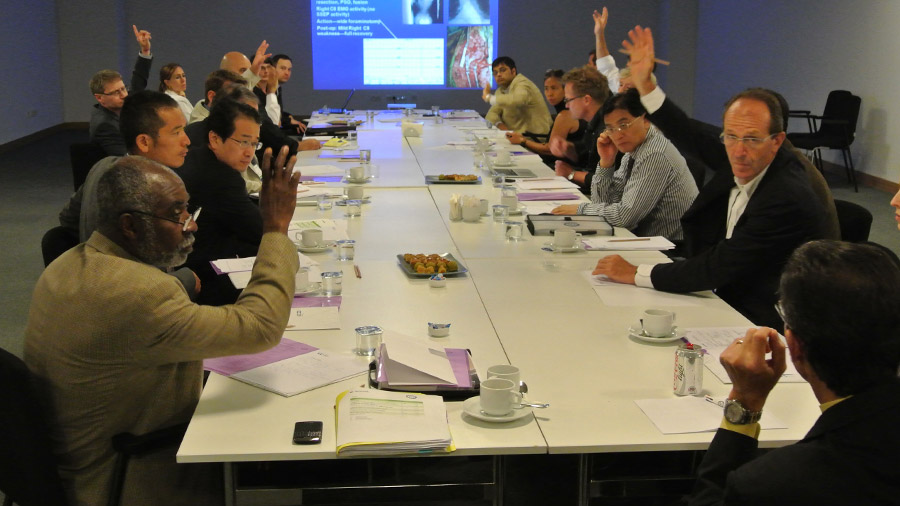Knowledge Translation in surgery: what the evidence means for practicing clinicians
BY DR CHARLES FISHER

Spine surgery is a multidisciplinary field that address a range of spinal conditions, including oncology, infection, deformity, degenerative disease, trauma, and spinal cord injury. It is a demanding specialty, due to its procedural complexity, reliance on technology, associated surgical risks, and most importantly the critical decision-making involved.
A surgeon’s training, technical expertise, tacit knowledge, and experience significantly influence their practice, making the adoption of new knowledge and surgical technology and techniques challenging. This poses a demanding Knowledge Translation (KT) challenge considering other existing barriers such as career stage, academic vs community-based practice, regional resources, cultural differences and reimbursement considerations. Given these challenges, effective KT strategies are critical for improving the uptake of research findings in spine surgery.
While KT has been explored in various medical fields, there is a paucity of literature on the barriers and enablers influencing surgeons to change their clinical practice based on best available evidence; even less evidence exists specifically for spine surgeons.
-
Read the quick summary:
- AO Foundation’s Knowledge Translation initiative outlines a framework to speed research into orthopaedic practice.
- The goal is to cut 15–17-year lag, with two AO Spine pilot projects underway.
- Surgeons will gain quicker access to proven, evidence-based knowledge and techniques.
- Next the test will pilot for impact, adaptability, and wider rollout.
Disclaimer: The article represents the opinion of individual authors exclusively and not necessarily the opinion of AO or its clinical specialties.
Why knowledge translation matters in surgery
Unlike other areas of medicine, surgery involves not only conventional medicine, but a heavy reliance on surgical techniques and technology. Thus, an immediate and measurable impact on patient outcomes. Every decision in the operating room, from pre-op planning to post-op care, carries risks and opportunities for improvement. Integrating evidence-based protocols into this space can dramatically improve safety, efficiency, and outcomes.
But the existing challenge is steep. Surgeons face unique barriers to practice change, such as institutional policies, investment in learning new techniques, high technology costs, complex workflows, and sometimes cultural resistance within teams. Without structured approaches, even proven innovations struggle to take hold. Knowledge translation provides a generic roadmap for overcoming these challenges, helping clinicians and institutions alike to adapt effectively. Surprisingly, however, surgeon and region-specific KT recommendations, along with sustainability and impact evaluation were lacking.
What the literature tells us
The scoping review examined 34 experimental and quasi-experimental studies focused on KT interventions in surgery. While there was wide variation in how change was approached, three categories of strategies consistently stood out as the most common and effective.
- Educational materials and outreach – Training resources, surgical videos, mentorship programs, simulations, and structured protocols help ensure that surgeons and teams understand and can apply new practices.
- Reminders and prompts – Email alerts, posters, dashboards, and real-time monitoring reinforce correct practices and keep protocols visible during busy workflows.
- Audit and feedback systems – Data-driven approaches monitor compliance and outcomes, with studies showing reductions in surgical site infections, shorter hospital stays, and more consistent care.
The evidence is clear: no single tactic works best on its own. The most effective KT efforts bundled educational outreach with real-time reinforcement and structured feedback.
Barriers and enablers for KT
While KT strategies have shown promise, their success depends on the context in which they are introduced. The review highlighted a number of barriers that can undermine implementation efforts, as well as enablers that support long-term adoption.
Common barriers included:
- Resistance to change and physician preference for existing practices
- Limited leadership and managerial support
- Financial and resource constraints, especially in smaller hospitals
- Workflow disruptions caused by integrating new practices
By contrast, enablers of success included:
- Strong leadership and clinical champions
- Structured education and ongoing mentorship
- Interdisciplinary collaboration and knowledge-sharing platforms
- Financial and organizational incentives aligned with quality goals
What does this mean for practicing clinicians
For surgeons and their teams, these findings translate into several actionable lessons. Rather than thinking of KT as a theoretical concept, clinicians can apply the following insights to their own practice.
- Layered change works best: Expect gradual implementation and bundled interventions including education, reminders, and audits to have the most impact.
- Collaboration is critical: Interdisciplinary teamwork improves buy-in and sustainability.
- Feedback drives improvement: Transparent data on compliance and outcomes helps maintain momentum.
- Context matters: Barriers like resources and culture should be identified and addressed early.
- Leadership is key: Visible support from champions and institutional leaders accelerates adoption.
Implications for the future
Looking forward, the review raises important questions about scalability and sustainability. Most studies to date were hospital-based and US-focused, leaving open questions about how well current KT strategies translate to other health systems, outpatient settings, or resource-limited environments. There is also a risk of publication bias, since failed attempts are rarely reported.
For practicing surgeons, this means two things:
- Be cautious about universal solutions—adapt interventions to your local context.
- Embrace gradual, context-sensitive adoption rather than rushing large-scale changes.
Knowledge translation is a necessity for improving care
Knowledge translation is no longer merely an academic concept; it has evolved into a practical necessity for enhancing surgical care. Both researchers and clinicians must endorse and implement knowledge translation practices. This study has delineated key concepts including bundled knowledge translation interventions, strong leadership, structured feedback mechanisms, and interdisciplinary teamwork, which are instrumental in fostering surgeon engagement. Additionally, the study has identified substantial gaps in the existing literature regarding specific knowledge translation interventions, influential variables, and impact assessments. These gaps necessitate strategic, targeted knowledge translation research under the leadership of AO Spine.
About the author:
You might also be interested in:
AO Knowledge Forums
AO Spine generates knowledge that matters to our members and to our patients, directly applicable to your clinical practice.
AO Spine Clinical library and tools
Designed to develop your competencies and improve your patient care.
AO Spine annual meeting GSC
The Global Spine Congress is we all come together to exchange ideas, network, and learn about the latest research and technologies in spine surgery.
Publish in AO Spine’s official journal
The Global Spine Journal is the first truly fully Open Access journal in the field of spine surgery with an Impact Factor.






